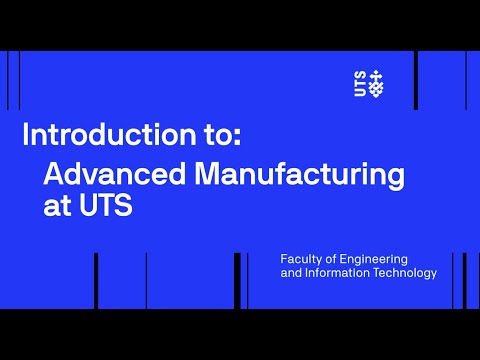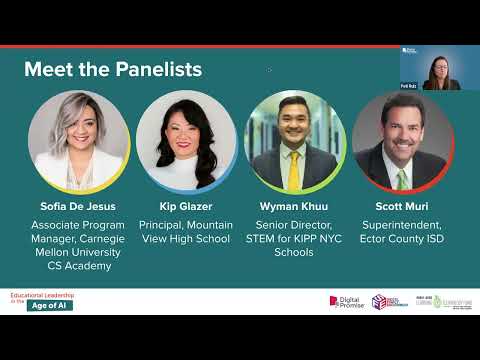UTS Advanced Manufacturing

What is advanced manufacturing? We're talking about particular digital technologies. And you might have heard the name industry 4.0, or industrial Internet of Things, which is really, I guess, game changer in the manufacturing industry. So if you imagine manufacturing to be dirty, and, and not very smart, it's exactly the opposite. So, what we do find in this area is of course, automation and robotics, which we are using for four decades already and are pretty advanced.
And you find this type of factories all over the world. And you do find them in Australia. For example, if you go to to Victoria, to Clayton, you will find semiconductor manufacturing plant at the Bosch site using high tech automation for assembly for manufacturing wafers. Here, there is no artificial intelligence in particular and machine learning, changing changing the the competitiveness of manufacturing. So what we do find is the application of
machine learning in many areas of manufacturing, like quality management, or predictive maintenance, and in order to fit the algorithms, we have sensors in place, which you might all know from your smartphones, which basically are the foundation for acquiring and obtaining data, which is then applied in, which is then applied in data analytics, for example. This is actually an recent report done by the World Economic Forum. And it's the future of job serving for 2020, which is looking into different industries, as well as, in particular the manufacturing industry. And it clearly indicates what type of technologies are emerging in the area of advanced manufacturing. And what is really interesting
is that on a very high ranking level, we have the Internet of Things and connected devices. We have the application of robots in industrial automation, the application of drones. And I would like to mention the 3d and 4d printing and modelling as well as the application of artificial intelligence. And it's very likely that these technologies are adopted in manufacturing and there are various Australian industries, which are particularly interested in artificial intelligence, and IoT. And that's exactly why we are focusing on these technologies in research and teaching at UPS apart particularly in the centre for advanced manufacturing. So you can you see can see here on the photo some impressions of our labs, we have a dedicated training environment for industry 4.0 training on connectivity on database, this
antenna systems. We have proto space, which is a vast area of infrastructure for additive manufacturing and UPS available. We are doing research in collaborative robotics. And we are just about to commence the Australian Training Centre for collaborative robotics, which is the last k research project aiming an industry training. And of course, that's industrial data science, which is the application of artificial intelligence in manufacturing. So it is really a very, very strong nexus between manufacturing computer science, which actually makes advanced manufacturing. So, this is just
only one example for one of our labs which we are using for teaching and research, and it's farming producing micro ag on an industrial scale. So what you can see here on the slides are two photo bio reactors in a fully automated environment and the purpose is to grow micro AG, as an input for the pharmaceutical and the food industry. And the whole system is highly automated, so you can see here for Example collaborative robot, which is mounted on a mobile platform, which is basically supporting the IV harvesting process and we have a we have a set up here, which allows us to have a complete digital twin of the production process. So, it just
states state of the art hardware like demons, prt equipment and, and smaller control loops. And all this is connected to the internet, wire edge devices. And then we are using a cloud based data platform, which is mindsphere, in order to enable a structured way of obtaining and gathering data as a foundation for applying data science. So as I said, if you are decide on
studying and doing a degree in advanced manufacturing, you will definitely get in touch with information technology, and machine learning technologies at the same time, as you learn about manufacturing technology. And these processes. And I believe what is really important here is that we were really considered about the Australian industries structure. So it's not only manufacturing, traditional manufacturing industries we are looking into, but if you take a look at the next slide piece, you can see that we are addressing professional roles in different types of industries. So we're strong restaurant industry partnerships with medical device design and manufacturing. Sustainable manufacturing becomes more and more important as the absorption of carbon dioxide emissions plays a significant role in what we are doing. We have strong activities in the food and beverage
industry. So we are for example, collaborating with john Henry's brewery for automating and making the industrial brewing processes matter. We are talking about control centre development and we actually have a we have a supply chain group in visit our centre. As the industry's the defence industry, we are doing
project with agriculture industry and the mining and energy industries. And what might be of interest to prospective students is that we have such a strong nexus between research and teaching, which allows us to actually involve students in industry related research projects, which are an avenue to go for work experience in the internships, and really getting hands on on training and teaching trends on training experience. And having said this, I would like to pass back to Tim, who gives you will give you more insights on how the cost structure is actually set up at UT. Nice. Thank you very
much. ETS offers a number of opportunities for you to study or to undertake studies in advanced manufacturing. One of the main ones is his Bachelor of Engineering honours programme. This is a flagship programme and we offer it with a lot of a number of majors to see a list of them up there, mechanical, mechatronics, biomedical, etc, etc. What you want out there is advanced manufacturing. But where that comes in is we have what we call a flexible major. This is the Bachelor of
Engineering honours without a particular name major, but it is accredited by engineers Australia as a full professional engineering degree. And within that programme that you can undertake subjects like advanced manufacturing, I'm just going to see if I can change this slide. That'll be the next thing I can do. With the flexible engineering major. It's the same as the other majors you can do it in a as a combined degree with, with business or with science and the other options that you have for combined degrees. But within the actual
major, it's really an opportunity for for you to to undertake or set your own destination your own study journey. Currently, it's used by a number of students by a significant number of students who aren't sure about what they want to study. Come along and study engineering for a year or even longer, and then decide on a particular major one of the nine majors you saw in the previous slide. An alternative to that, and one that we're quite proud of is that you can, you can set your own destination. And for example, you might say, I want to become an engineer with a good background in advanced manufacturing. And by doing that, you'll get a subject selection available to you, that will define a path for you to get to that, that advanced sub major. We use this as an opportunity for us to to explore
emerging areas. So you'll find that we have sub majors in renewable energy, we have sub majors in chemical process design, we also have, or about to have a sub major in space engineering. The one we're talking about today, though, is a sub major in advanced manufacturing. So you're going
to do an engineering degree, you're going to concentrate on advanced manufacturing, if you choose is. This is the structure of the of the programme that it's, you can see it's spread over five years, it starts up to four subjects a year session one through to session 10. These red subjects are the core engineering core subjects and these subjects you will do with every other engineering students. So it won't just be with the advanced manufacturing students, it will be with all the students. Those subjects are things like the introductory maths, and physics subjects that underpin all engineering, subjects in economics and finance or project management, entrepreneurship and innovation, the sorts of subjects that are relevant to every single major, you also undertake, undertake a significant Capstone at the end of your programme. And that's where you'll do two subjects over year, one, one in preparation for a project, and then one in completing that project. And that brings together what you've been
studying. If you were doing advanced manufacturing, that Capstone would concentrate on advanced manufacturing. The rest of the programme, these blue and these black subjects are subjects that technical subjects that define the major that you're doing, or define the area of specialisation that you're doing. So there are some some subjects back here and forth. For example, if you're doing advanced manufacturing, you do some subjects in engineering and some chemical engineering, from subjects that have some electrical component or mechatronics component. And as you move forward, you choose more and more subjects, or you choose subjects that are specialists, specialists, subjects in advanced manufacturing. In fact, in these final stages, you might even
choose subjects that would normally be part of a master's degree, you have a number of electives, where you can do that. One thing that you might have noticed here is that there's this Diploma of engineering practice component here, which takes up a full year. That is an opportunity for you to complete two months to six month periods in work. And
as Johan was saying, the the opportunities in manufacturing, we hope will be will be plentiful. And you'll be able to go on with it that you do one quite early in your programme, you do one quite towards the end, the only one for me, and I've been at this university for a long time on. The only one for me is a very important internship. It's one where you go out and you see engineering live, you see the discipline that you're interested in live, you might not be taken on very advanced projects there, but your roles there, but you'll be working in an engineering environment, that might be the sort of environment you're going to work in, it'll give you a chance to confirm your interest in engineering. The other thing I think it does is once you've come back from that internship, you join the classroom again, where 70% or so of the students in that classroom have also had had a period of experience in work. And so it really changes the dynamic in that classroom. No longer is it so much a
teacher student it's it's a it's an engineer engineer relationship. And I think that changes and makes it a very valuable experience. That's why that's why I say I think this one's very important. The second one is very important for you though, that very often is a six month path for you and an employer to interview each other, to get to know the industry and then to get to know you and very often. These last these later stage internships lead to a job lead to a job.
Either you finish the programme part time or in some cases, the employer will invite you back once you graduate. As I said, these are very important and they really do allow you to build networks within the industry. The fact that you might be in a classroom with 200 students or you come across 200 students and they've had 200 different opportunities in industry early in their programme gives you a Understanding when you speak to them and when you share your experiences, it gives you a really good understanding of the industry that you're about to be involved in. In fact, I think many of our students have a better understanding of industry, broad industry, then practitioners who have been with one company for a period of time. That's one way of moving into advanced manufacturing UT is another way and a very specialist way that's been developed here is a Bachelor of Engineering studies majoring in advanced manufacturing. So this
is a dedicated programme for advanced manufacturing. It's a three year programme. It's not a four year programme, or a five year programme as the other one is. So you get out into industry quite quickly, you don't become a speaker about this in a couple of slides time, you don't become a professional engineer, but you become what we call or what engineers Australia call an engineering technologist. I'll go into that a little bit more. This programme has a far more concentrated, a far more technical focus than than the broader engineering programme.
So it really is concentrated a lot of subjects technical subjects, specifically related to advanced manufacturing. And one of the things that I think should be an advantage for this three degrees, that you're looking at an area that's growing, despite what people say about manufacturing, and we have seen some some the demise of some manufacturing industry in Australia, it is still one of our major exporters and every government well, possible government, shall we say, the current government and the opposition are dedicated to developing an advanced manufacturing capability within Australia. I think the COVID pandemic helped focus a little bit on you would have heard during that. Leaders saying that we need to have a sovereign manufacturing capability. And
both sides are offering billions of dollars to stimulate this market. I think it you know, if they get it right, this is a growing area. And if you do a three year degree, you'll be coming out into a growing area, which I think could be could serve you very well, getting in on the ground floor if you like. Obviously the future, I can't tell you the future. But that's
where our leaders are looking towards the engineering study programme, it has a similar sort of structure for four subjects per session. But this time for only six sessions stead of 10. Some of them we've tried to do a little bit here design divide the discipline of advanced manufacturing into into some components that you'll see you do some early stage subjects in maths and, and mechanical manufacturing, engineering, physical modelling, and then you move on to the production system design, factory model modelling and simulation, additive manufacturing, advanced problem solving, which employers have identified as something that's essential for the future. And all these subjects very closely related to to advanced manufacturing, you also get the opportunity to do four electives, and they can be free elective. So you can do them from within, within engineering from within. from other faculties, you know, you might
want to add some business subjects or you might want to add some science subjects involved very much in the additive manufacturing, you might want to look at materials from what you need more depth, but you get those options. You don't have to do it in this order. But these are the subjects that you would cover in an engineering studies programme. You can also even if you're in another major in one of the other majors, for example, and most probably in mechatronics, or mechanical engineering or electrical engineering, you can take a group of subjects, or subjects as electives in those majors as well. And those four subjects could be related to advanced manufacturing. So we offer a number of ways for you to experience advanced manufacturing at UCS.
One of the things I just wanted to clarify in advance of any questions, I guess is that the engineering profession in Australia is basically categorised in three, there are three occupational groups within it. There are the engineering associates, the engineering technologists and the professional engineers. Now that's words that there was an engineer's failure the professional society for engineers in Australia used to describe the map they're members of the the categories of their members or the the occupational areas of their members. Typically an engineering associate has a two year post secondary programme so there'll be an associate degree or an advanced diploma, an engineering technologist, and that's the one we were just talking about with the Bachelor of Engineering studies in advanced manufacturing, typically does a three year programme and around Australia, they noticed Bachelor of Engineering studies or Bachelor of Engineering Science or Bachelor of Engineering Technology. These are less common in Australia, although you'll find that in Melbourne and in Western Australia universities offer these as their only programmes. So
University of Melbourne and university, a bit less common in Australia, probably more common overseas, but we believe that they will probably grow, they serve a real purpose in industry. And then the professional engineers have four or five year post secondary programme typically a Bachelor of Engineering honours, or a master of professional engineering. And we offer both of those. One thing I think you should notice, if you come in through one of these engineering technologist programmes, and at some stage later, while you're working, or even before you start working, you can transfer or you can ask to get entry into a four or five year programme, certainly at UPS but at other universities, as well. And so there are pathways between these different occupational groupings within the engineering profession. At that stage, now,
I'm going to hand back to Amir because he is the expert on what you need to do to progress towards studying advanced manufacturing beauties. Thank you so much for that Tim Murphy. All right, I believe everyone can see my screen so he just sees subject selection. So think New just does not have any prerequisites. We do recommend
mass extension one advanced English however, I'll get into a bit more detail about that soon. And Physics for that engineering courses. We do not assume you have an IPT or engineering studies. We do offer adjustment points here at ETS. New Ts does cappelle adjustment points to 13. So you can be given adjusted
points for many factors, including completing the ETS engineering allowance IE question. good results in relevant HSC subjects, your gender as well as special considerations such as COVID, and more. Next up, sorry, there we go. So University application process. I know this slide looks a bit daunting. However, I'll break it up for you. So we do offer scholarships, and some applications are open right now.
So you can check that out on our website. We have open day coming out on August 28. More importantly, there's some le offers that happen from January to August. And yeah, then from
September to November, we've got the HSC as many new 12 students though, and December to March, there's multiple rounds where you can get alpha course. So this is when you can swap swap your course preferences and stuff for every month to see if you get a different offer. Awesome student support. So as I touched on before, although we do recommend maths extension, we do offer bridging courses for Maths, Physics and Chemistry.
And these are just little short courses they do right before you start University. Additionally on that we do have you past this is p assistant study success. And for this it's essentially someone who's done this subject a semester or two before and got really great marks and they helped you to you throughout those subjects if you happen to be struggling in maths or physics, for example. So soon I'll go into our questions but before we do, I just want to let you know you can connect with us digitally. If you have any questions feel free to email us at fear@utsa.edu.au. We've got our social medias, you can keep your eye out there, as well as our website. For more
information about our courses have a breakdown of specific subjects. For example,
2021-07-13 09:49


